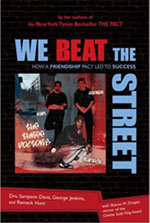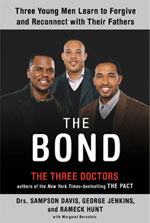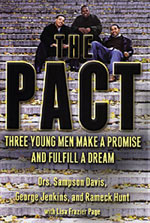We Beat the Streets
 We are excited to bring to our readers, We Beat the Street, our first children’s book ever! Similar to The Pact, We Beat the Street details our inspirational story of how we overcame obstacles and became doctors. Geared towards a younger audience, middle school and young adults, We Beat the Street offers instructional, dramatic dialogue through detailed life experiences.
We are excited to bring to our readers, We Beat the Street, our first children’s book ever! Similar to The Pact, We Beat the Street details our inspirational story of how we overcame obstacles and became doctors. Geared towards a younger audience, middle school and young adults, We Beat the Street offers instructional, dramatic dialogue through detailed life experiences.
Each chapter is followed by a one on one conversation where we offer advice on how to deal and overcome real life obstacles. We speak candidly and openly on ways to navigate challenging roads to achieve success. Throughout the book are pictures for the reader to enjoy, illustrating our lives. We Beat the Street is a powerful, inspirational, much needed story that offers hope to individuals from all walks of life.
It will motivate young people who feel that they have come to the end of possibility, encourage those who need a boost and blend perfectly with others who feel they are on the right path. Young people will read it, absorb it, and share it with their friends. Parents will love and embrace it. It is indeed a must read!
BILL COSBY, after reading this book, said with great enthusiasm, “All parents must read this book! First the parents, then the child”
OPRAH WINFREY, has excitingly labeled The Three Doctors as the leaders of role modeling naming them, “The Premiere Role Models of the World”.
SUMMARY: Sampson, George, and Rameck could easily have followed their childhood friends into drug dealing, gangs, and prison. Like their peers, they came from poor, single-parent homes in urban neighborhoods where survival, not scholastic success, was the priority. When the three boys met in a magnet high school in Newark, they recognized each other as kindred sprits that wanted to overcome the incredible odds against them and reach for opportunity.
They made a friendship pact, deciding together to take on the biggest challenge of their lives: attending college and then medical and dental schools. Along the way they made mistakes and faced disappointments, but by working hard, finding the right mentors, separating themselves from negative influences, and supporting each other, they achieved their goals–and more.
In We Beat the Street , The Three Doctors collaborated with award-winning YA author Sharon Draper to bring their childhood, teenage, and young-adult anecdotes vividly to life. The brief “conversations” with the doctors at the end of each chapter provide context and advice in a friendly, non-intrusive way. Young readers will be captivated by the men’s honest accounts of the street life that threatened to swallow them up, and how they helped each other succeed beyond their wildest dreams.
Excerpt 1 George–Age 8:
During the intermission of the classical symphony, a woman wearing too much perfume and a mink coat, even though it was the middle of spring, walked up to George and said, “What lovely sweaters you and your classmates are wearing.”
“Thank you, M’am,” George said with a grin, touching the careful embroidery.
“What private school do you children attend?” the woman asked.
Miss Johnson walked over to the woman and said proudly, “These are students from Louise Spencer Elementary, a public school in the Central Ward.”
“But they’re so well behaved,” the woman said with surprise. “Isn’t that school in the ghetto?”
Miss Johnson gave the woman a look that could have melted that mink coat and led her students away. George looked back at the woman with hurt and confusion. He wished he could have tripped the smelly old lady.
On the way back home from this trip, George, always the quiet kid, sat alone on the bus seat. “Mind if I sit next to you, George?” someone asked.
He looked up, pulled his long legs out of the aisle, and smiled at her. “Sure, Miss Johnson.”
“Did that woman upset you?” she asked.
George shrugged. “I don’t know. She smelled like moth balls.”
“There will always be people like that, you know,” Miss Johnson explained.
“Yeah, I know.”
“And you can either let them hold you back, or you can ignore them and go on and do your thing.”
“Yeah, I know.” George didn’t want to admit how much the woman’s words had hurt. He changed the subject. “That was a good concert, Miss Johnson. I think it’s really cool that you take us to stuff like this.”
“Perhaps when you go to college you can learn to write symphonies or plays of your own,” she said.
“College? I never even thought about it.” To George, the idea of college seemed like something foreign and vague, like going to China or the moon.
“Of course you’ll go to college. You’re one of the smartest children in my class.” Miss Johnson spoke with certainty. “I have high hopes and great expectations for you, George.”
“Maybe you do, but some kids think it ain’t cool to be too smart, you know,” George told her.
“That’s the dumbest thing I ever heard!” Miss Johnson said loudly. The other kids on the bus looked up to see what had upset her.
“You don’t understand,” George said quietly. “It’s hard to fit in with your boys if your grades are too good.”
“Nonsense!” Miss Johnson replied. “You don’t really believe that.”
George grinned at her. “Yeah, I guess you’re right. I guess I really don’t care what they think of me.”
“College is cool, George. If you can fit in there, you’ve got it made.”
“Doesn’t it take a long time?” George asked, chewing on his lip. He felt a combination of excitement and wonder.
“It takes four years to complete the first part of college,” she explained. At the end of that time, you’ll be four years older whether you go to college or not, so you might as well go and get as much knowledge in your head as you can.”
George looked out of the bus window and thought about what she had said. As the field trip bus got closer to his neighborhood in Newark, he looked at the tall, poverty-ridden, high-rise apartments like the one he lived in, the boarded-up and defeated stores, and the trash all over the streets.
“I don’t know how,” he said quietly, helpless in his lack of knowledge.
Miss Johnson didn’t laugh, however. She just smiled and said, “It’s not very hard. Just do your best, keep your nose out of trouble, and one day the doors will open for you.”
For the first time, George could see a glimpse of light, a spark of hope and possibility. College. What a cool idea.
George–Age 8
Excerpt 2:
Sampson–Age 1 1
“Yo, Sampson, you want to go into business with me, man?” seventeen-year-old Eddie asked Sampson.
“What kind of business?” Sampson asked warily. He had known Eddie ever since grammar school and knew that Eddie had been in trouble with the police several times, so he wanted to feel out the situation before giving an answer.
“It’s all legal, man. I’m straight. I’m gonna start me a carpet cleaning company.”
“That sounds good,” Sampson replied. “I always wanted to be a professional. Things are pretty tough at home, and I could use a gig.”
“I need workers–men to help me clean up places like office buildings and stuff. I’ll pay you good money.”
“How much?” Sampson asked.
“I don’t know yet, but it will be good,” Eddie replied.
Sampson, always looking for creative ways to make some dollars, thought this would be a good opportunity. It sounded more lucrative than helping people at the local grocery store bag their groceries or carry the bags to their cars or for loose change. Any legitimate way that he could earn a little extra money sounded okay to Sampson.
“When do I start?” Sampson asked. “Well, your first job is to help me get the equipment. It’s waiting for me at the store.” Sampson figured his mother and even Reggie would be proud of him for making a wise judgment call. After all, Sampson had always considered himself a sharp decision-maker. The two boys walked a mile to the store, then wandered around inside for a few minutes, looking at the equipment.
As they were leaving, Eddie, whose hands were full, said to Sampson, “Grab that machine for me, man. We’re ready to go.”
Sampson walked over to the heavy carpet-cleaning machine and slowly pushed it out of the front door of the store. It was too heavy to carry, so he pushed it carefully down the sidewalk, in full view of people walking and cars driving.
Halfway down the block Sampson heard a police siren as a patrol car stopped right next to him. He looked around in genuine surprise as the police officers jumped out of their car and grabbed him. “Where did you get that machine, boy?” one of the cops asked him.
“From the store back there,” Sampson answered honestly. “It’s for my friend Eddie’s new cleaning business.” “And who is this Eddie?” the officer asked.
Sampson looked down the street. He could just barely see the back of Eddie, running away as fast as he could, about to disappear around a corner. Sampson’s heart thudded in his chest. “How could Eddie play me?” he thought. Instead of understanding what had happened, the police officer saw only a boy with a stolen machine on the sidewalk. Sampson felt his hands being pulled behind him and the handcuffs being laced to his wrists. He was in total disbelief.
The police tossed him in their car, took him to headquarters, and booked him for shoplifting. No matter how he tried to explain his innocence, no one wanted to listen. Being set up was the same as being guilty, it seemed, and no one had much sympathy for him.
Sampson—Age 11
Excerpt 3: RAMECK–AGE 9
Nine-year-old Rameck Hunt had a difficult time in fourth grade. Sitting in the principal’s office for the third time that week probably had something to do with it, but he sat in the “Oh-man-you-in-trouble-now” chair, and waited for the nun to come out of her office and yell at him once more.
“Rameck, what have you done this time?” she asked with a deep sigh as she opened her door and ushered him into a room that was so small he felt he could not breathe. The tall nun, dressed all in black, never smiled.
“It wasn’t my fault, Sister. I finished my work, and I just wanted to see if I threw my pencil up to the ceiling real hard, if it would stick there. So I kept tossing it up, I almost made it, too,” he added proudly. “Then a couple of the other kids saw what I was doing and started tossing their pencils up to the ceiling, so the teacher threw me out of class. Again.” Rameck knew his explanation sounded dumb, but at the time he was trying to get the pencil to stick in the ceiling tile, it made perfect sense to him. He picked at a loose thread on his uniform. “Of course it was your fault,” the nun replied sharply. “Someone could have been seriously hurt when the pencils landed.”
Rameck wanted to tell her that he doubted if a falling pencil could kill anybody, but he figured he was in enough trouble already. He sighed and wished once more that his mother had not transferred him from public school to this Catholic school where the rules were strict and the academic work was easy.
“Why didn’t you just do your arithmetic like the rest of your class?” the principal asked. “There were one hundred problems on your class work assignment.”
“I finished it, It was easy,” Rameck told her. “We learned multiplication and division when I was at my old school.”
It was the principal’s turn to sigh. “Rameck, little boys who cause constant disruptions in class never grow up to be successful people. You must learn self-control.”
“I’m trying, Sister,” Rameck said, “but I get bored, and my mind gets to thinking about stuff, and then I’m in trouble again.”
The principal cleared her throat. “Your teacher and I think that perhaps you should be tested for Special Education. Perhaps your mind is not mature enough for a regular classroom.”
“What’s special education?” Rameck asked. He rarely got to feel special at school these days. Perhaps this was something really cool.
“It’s a classroom where the pace is slower, the classes are smaller, and you would not have the distractions of so many academic and social challenges,” the principal replied.
Rameck frowned. “I know what you’re really saying. But I’m not slow, Sister. I like doing the work in class. Really.”
“We will discuss this with your mother when I speak to her. We feel it might be for the best,” the principal said. “Get back to class now, and try to behave.” The principal looked at him through the glasses perched on her nose. “Oh, and Rameck. . .”
“Yes, M’am,” the boy replied as he turned to leave.
“Tell your mother that her tuition payment is late.” Rameck just rolled his eyes and walked out of her office. The principal made him feel angry and stupid. He balled up his fist and knocked over the chair that was reserved for kids in trouble and stormed into the hall.
Rameck—Age 9
Sharon Draper Biography
Sharon Draper, 1997 National Teacher of the Year, is a professional educator, as well as an accomplished writer. She was selected as Ohio’s Outstanding High School Language Arts Educator, was chosen as a NCNW Excellence in Teaching Award winner, and Ohio Teacher of the Year. She received the Excellence in Education Award, is a Milken Family Foundation National Educator Award winner, and was the Duncanson Artist-in-Residence for the Taft Museum. For more information on Sharon Draper visit www.sharondraper.com





 Order Today
Order Today Order Today
Order Today Order Today
Order Today